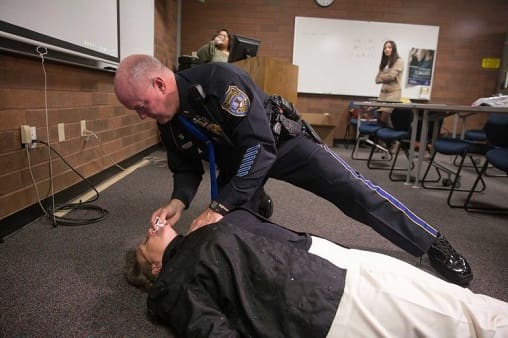
In Connecticut, the Meriden Healthy Youth Coalition (MHYC) used the Drug Free Communities grant to leverage matching funding to purchase Narcan kits, which would be provided to the local police department for opioid overdose reversals. Meriden Police Chief Jeffry W. Cossette emailed the Mayor and members of the Meriden City Council to let them know that officers had helped save the life of an opioid overdose victim by administering Narcan after receiving training from coalition representatives.
“We are very proud to see that the Meriden police officers have been able to take their training and use it in a real-life situation where someone was able to benefit from it,” said Sheryl Sprague, Rushford Prevention Manager and Project Director for the MHYC Drug Free Communities Grant. “The ongoing collaboration between Rushford, the Meriden Healthy Youth Coalition and Meriden police is certainly having a positive impact on our community.”
Chief Cossette told Mayor Scarpati and members of the City Council that officers found an unresponsive man on the street in January and quickly determined he was experiencing an overdose. The officers quickly administered Narcan, which reversed the overdose symptoms and allowed the victim to recover. Chief Cossette praised the officers who alertly administered the Narcan, as well as the Rushford representatives who provided Narcan training to department officers during a series of sessions in November. Although police are not first responders for medical calls for service, there is clearly a time in which they are the first emergency personnel on the scene of an incident. In this instance, the officers were instrumental in saving someone’s life.
The MHYC serves Meriden, Connecticut, a growing city of approximately 60,300 people and an area of 23.7 square miles. Located 90 miles from New York and 120 miles from Boston, Meriden is a central location on the drug distribution highway.
MHYC utilizes the Strategic Prevention Framework, cultivating unique partnerships to leverage donations, additional grants and in-kind services. Because the coalition is associated with a behavioral health center, they have been able to ingrain prevention into the continuum of treatment and after-care.
According to MHYC Chairperson Krystle Blake, “coalition memberships will peak and wane. You can’t get discouraged. Continue to focus on the mission of your coalition, share successes, challenges and best practices with other coalitions. Celebrate milestones and keep recruiting so you can continue to be an agent of community change.”


